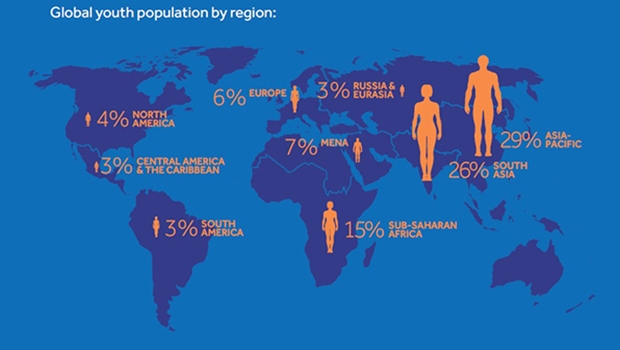Out of the 181 countries surveyed, Nigeria came in at number 161 on the 2020 Global Youth Development Index that checks for the status of youths globally.
This was revealed by the Commonwealth Secretariat on Tuesday, in its triennial rankings of youth development in 181 countries, adding that only 156 countries surveyed recorded slight improvements.
Globally, the lives of youths have seen positive growth by 3.1 percent between 2010 and 2018 but, according to the report, the “progress remains slow”.
It added that the data collected pre-COVID-19, which is positioned on a positive track, could be negatively affected by the emergence of the pandemic.
It added that the reversal, in the seeming progress, can be forestalled by quick government actions to ensure that conditions return to the pre-COVID-19 period.
For the first time, Singapore came out atop the list of countries, followed by Slovenia, Norway, Malta, and Denmark.
Conversely, countries like Chad, the Central African Republic, South Sudan, Afghanistan, and Niger ranked bottom.
Report’s Highlights
The report stated that “Health made the largest gains of 4.39 percent driven by a 1.6 percent decline in global youth mortality rates and a 2 percent drop in each HIV, self-harm, alcohol abuse and tobacco use. Sub-Saharan Africa made the greatest strides in improving the health of young people.
”Levels of underemployed youth and those not in school, training or work remained constant. Advances in equality and inclusion are led by improved gender parity in literacy as well as fewer child marriage cases and pregnancies in girls under 20. Yet no progress occurred in women’s safety.”
In terms of education score, the report said that South Asia made the most impressive leap by 16 percent followed by sub-Saharan Africa with 10 percent.
On peace gains, Somalia made the most improvement in the peace and security of its young citizens followed by Colombia, Sri Lanka, Eritrea, and Russia.
“Youth participation in politics is the only domain to record a decline in most parts of the world, reporting a deterioration in 102 countries,” it noted.
It added, “However, sub-Saharan Africa recorded a 5 percent improvement in the average regional score.
“Globally, Sweden leads on education, Luxembourg on equality and inclusion, Indonesia on political and civic participation while Singapore tops the employment, health, and peace and security domains.”
READ ALSO: NBS: FG Records N515bn VAT Revenue in Q2 2021
Youths are Indispensable
The Commonwealth Secretary-General, Patricia Scotland QC, noted the importance of youths to a more progressive future, measured through available data.
She said, “Young people are indispensable to delivering a future that is more just, inclusive, sustainable and resilient.
“By measuring their contributions and needs with hard data, our advocacy for their development becomes more powerful, and we are then able incrementally to increase the positive impact and benefits youth are able to add towards building a better future for us all.
“Our Youth Development Index is a vital tool which has already significantly enhanced our capacity to assess the extent to which youth are engaged to contribute beneficially in their societies, and empowered by enabling policies and tools.
“While the data used to compile the index was gathered before the COVID-19 pandemic, the findings indicate where progress was being achieved and where it was not, and that urgent action is now needed so that pre-pandemic gains are not lost but sustained and developed further, more broadly and more inclusively.
“As we work to recover and rebuild from the many consequences of the pandemic, we need to draw as fully as possible on the energy and idealism of youth so that fresh opportunities for social, economic and political development are opened up with present and future generations of young people equipped and empowered to fulfil their potential.”













